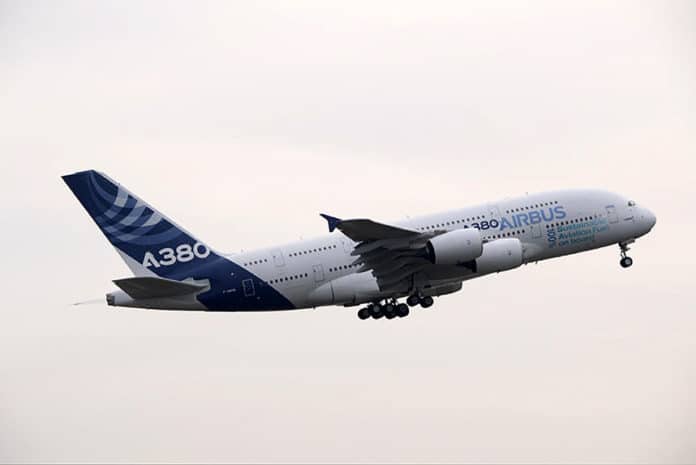The air transport industry, responsible for nearly 3% of global carbon dioxide emissions, has pledged to hit net zero by 2050 to help curb global warming. The industry believes that its quickest path to net-zero is replacing jet fuel with “sustainable aviation fuel (SAF)” made from renewable sources such as used cooking oil, municipal waste, and woody biomass.
Aviation companies and airlines have been testing commercial aircraft engines on 100% SAF. One of them is Airbus, which has conducted the first flight of its giant A380 jumbo jet powered by 100% Sustainable Aviation Fuel.
Airbus’ A380 test aircraft MSN 1 took off from Blagnac Airport, Toulouse, France, on 25 March. The flight lasted for about three hours, operating one Rolls-Royce Trent 900 engine on 100% SAF. For the test flight, the aircraft was loaded with 27 tonnes of unblended SAF made from Hydroprocessed Esters and Fatty Acids (HEFA), free of aromatics and sulfur, and primarily consisting of used cooking oil, as well as other waste fats. The second flight, with the same aircraft, then took place from Toulouse to Nice Airport on 29 March to test the use of SAF during take-off and landing.
This is the third Airbus aircraft type to fly on 100% SAF over the course of 12 months, as the company works to certify the technology by the end of this decade. The first two flights were conducted with Airbus A350 in March 2021, followed by an A319neo single-aisle aircraft in October 2021 using SAF.
Airbus says increasing the use of SAF remains a key pathway to achieving the industry’s ambition of net-zero carbon emissions by 2050. To emphasize the potential of SAF, Airbus refers to the Waypoint 2050 report, which indicates that SAF could contribute between 53% and 71% of required carbon reductions. All Airbus aircraft are currently certified to fly with up to a 50% blend of SAF mixed with kerosene. The aim is to achieve certification of 100% SAF by the end of this decade.
The A380 aircraft used during the test is the same aircraft recently revealed as Airbus’ ZEROe Demonstrator – a flying testbed for future technologies instrumental to bringing the world’s first zero-emission aircraft to market by 2035.
